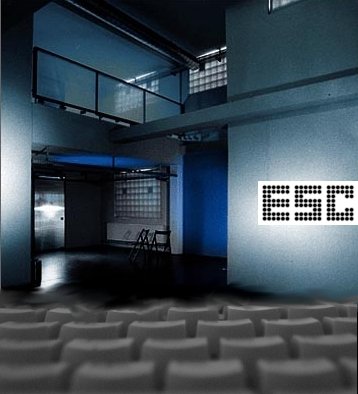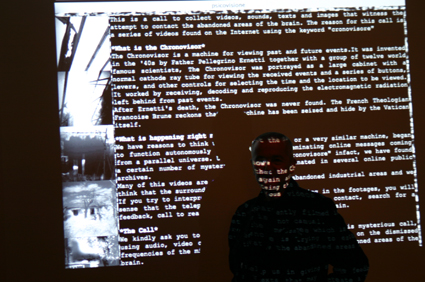
KUNST!
intro 2008
projekte + timetable + aktuell
künstler_innen | kooperationen | publikationen
leitbild | kontakt | map | team | archiv | home
hosted by mur.at
CENTRAL PROCESSSING UNIT
CPU ist ein Kooperationsprojekt zwischen
steirischer herbst, mur.at und ESC im LABOR
Agnese Trocchi | Lorenzo Cassulo | Nanna Lueth | Hannah Fitsch | Wolfgang Temmel | Karin Hofstätter | Christian Stalzer | Frank Barknecht | Andrew Garton | Ju Gosling | Donna Metzlar | Tatiana de la O | Anne Roth & Andrej Holm | Seda Gürses | Eran Sachs | Neset Özevin | Anna Loosen | Ernesto Rico-Schmid | Zoe Gudovic back
Photos
Impressions from the Opening, 4.10.2008
first weekend/first workshops, 5.10.2008 OpenHouse I "Access" - Ju Gosling, Men in White Coats, 17.10.2008
Programm
Zu einem Zeitpunkt, da Wissen, Erkenntnis und Forschung zunehmend von Konzernen und anderen Interessensgruppen privatisiert und damit der Zugang kontrolliert (kommerzialisiert) wird, gibt es in der Debatte um Geistiges Eigentum (Intellectual Property) eine Strömung, die von Personen getragen wird, die keine Milliardengeschäfte oder politische Macht mit patentiertem Wissen anstreben, sondern ihre Arbeitsweise, ihre Kunst, ihre Netzwerke ganz bewusst offen halten und damit einen freien Zugang zu Erkenntnis und Information ermöglichen. In der öffentlichen Diskussion werden neben den rein technischen und juristischen Aspekten rund um Freie Entwicklung und Software die massiven Auswirkungen auf unsere Gesellschaft vernachlässigt. Im Rahmen von CPU soll die Auseinandersetzung mit Zukunftsperspektiven unserer Gesellschaft forciert werden. Dabei sind Überlegungen zum eingesetzten Material ebenso wichtig wie die Reflexion über die Wahl der Werkzeuge, und die Medien, mit denen ein künstlerisches Werk realisiert wird.
Welche Relevanz hat Medienkunst heute? Sind (auch) Medienkünstler_innen, wie der Autor Bruno Preisendörfer meint, Leute, auf die es zumindest als Einzelne nicht ankommt? Die wie wir alle nur in der Mehrzahl wichtig werden (als Konsument_innen, als Publikum, als Wähler_innen), weil es ihnen einzeln an Geld, Macht und Wissen fehlt? Diese Haltung fordert CPUâ als temporärer Arbeitsraum für fünfzehn Personen aus verschiedenen künstlerischen Feldern und Technologiebereichen heraus: Bereits seit einigen Monaten hat hier die Entwicklung neuer Medienkunstarbeiten begonnen, die im Oktober in Graz gezeigt werden - als Installationen, Workshops, Performances und Vorträge.
In times, when knowledge, awareness and research are increasingly privatized and therefore controled (commercialized) by multinationals and other interest groups, the debate around Intellectual Property also contains another current: people, who don't aim at earning billions or political power by patenting knowledge, but who are willing to keep their way of working, their art and their networks open and therefore facilitate free access to awareness and information. In public discussions around aspects of free development and software, technical and juridical aspects are much more debated than the effects on developments of the society as a whole. In the frame of CPU, we want to deal with all possible facets of future perspectives and developments of our society.
In this field, reflections on the used material and choices on tools are as important as the media, in which an artistic work is realized. What relevance does media art have today? Are media artists (also) - as author Bruno Preisendörfer puts it - "people of no consequences", at least as individuals? Who only become important in the plural (as consumers, audience, voters), because they lack money, power and knowledge? CPU as temporary workspace for 15 people from different artistic and technological fields challenges this attitude: new media art works will be shown now in Graz - as installations, workshops, performances and lectures.
CPU Graz
Eröffnung/opening weekend: 4. - 5.10.
The shadow of frequencies
Agnese Trocchi - Candida TV, Rom, und Lorenzo Cassulo, 15multimedia, Trento
ESCLab I
Einführtung in SOMASuite/Introduction to SOMASuite
Data Cadavre
Nanna Lueth und Hannah Fitsch
Untersuchung wissenschaftlicher Bilder im Rahmen einer Tagung über die Verdatung des Organischen.
"laut, lauter, gebärdensprache"
Video
Wolfgang Temmel lädt ein
mit:
Karin Hofstätter; Linguistin, und Christian Stalzer Mitarbeiter am Institut für Translationswissenschaft
schusslig 1.7 beta
Frank Barknecht with "schusslig 1.7 beta", a Pd-based game that you cannot win.
Nothing Known
audiovisuelle Installation, work-in-progress von Andrew Garton
http://wiki.apc.org.au/index.php?title=Nothing_Known
ESCLab II
14. - 16.10.2008 during exhibition time
online meeting on topics of art and technology
OpenHouse I "Access" 17.10.2008, 19.30 Uhr
Will the Internet disappear?
What is this talk about ipv4 - ipv6?
Ripe, Lecture
Men in White Coats
Ju Gosling, media artist from London
PerformanceLecture und Installation
ESCLab III
22. + 23. 10.2008
Technologie zum Angreifen / a hands-on-workshop
ESC wird LABOR, ESC becomes laboratory.
Donna Metzlar, Tatiana de la O, u.a. (in englischer Sprache/in english)
ESCLab IV
23.10.2008, 19.30 Uhr
Einführung in Gebärdensprache
Introduction to Sign Language
Teilnehmer_innenhöchstzahl: 30
Voranmeldung notwendig. esc[at]mur.at oder 0316 - 836 000
OpenHouse II "Security and Surveillance"
24th of october, 19.30 Uhr
Wir sind alle Terroristen. Innenansichten einer Terrorismus-Ermittlung. We are all terrorists. Inner views of an investigation of Terrorism.
Anne Roth & Andrej Holm. Lecture (in deutscher Sprache/in german)
A failed coup attempt with folk songs (Part II):
Digital authenticity and evidence in a culture of sharing Computerscientist Seda Gürses
Lecture
Eran Sachs
"The issue of architecture and sound is incredibly interesting and relevant to me these days, as I try to understand the sonic aspects of "the architecture of occupation".
Performance
Neset Özevin and others
Schnappschüsse über die Durchsichtigkeit des Lebens
Installation
ESCLab V
Anna Loosen und Ernesto Rico-Schmid
24 - 26.10. during exhibition time
Workshop
